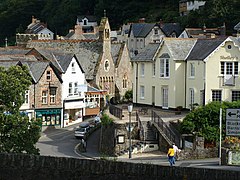| Lynmouth | |
|---|---|
 Lynmouth village | |
Location within Devon | |
| OS grid reference | SS7249 |
| Civil parish | |
| District | |
| Shire county | |
| Region | |
| Country | England |
| Sovereign state | United Kingdom |
| Postcode district | EX |
| Police | Devon and Cornwall |
| Fire | Devon and Somerset |
| Ambulance | South Western |


Lynmouth is a village in Devon, England, on the northern edge of Exmoor. The village straddles the confluence of the West Lyn and East Lyn rivers, in a gorge 700 feet (210 m) directly below the neighbouring town of Lynton, which was the only place to expand to once Lynmouth became as built-up as possible. The villages are connected by the Lynton and Lynmouth Cliff Railway, which works two cable-connected cars by gravity, using water tanks.
The two villages are a civil parish governed by Lynton and Lynmouth Town Council. The parish boundaries extend southwards from the coast, and include hamlets such as Barbrook and small moorland settlements such as East Ilkerton, West Ilkerton and Shallowford.
The South West Coast Path and Tarka Trail pass through, and the Two Moors Way runs from Ivybridge in South Devon to Lynmouth; the Samaritans Way South West runs from Bristol to Lynton, and the Coleridge Way from Nether Stowey to Lynmouth.
Lynmouth was described by Thomas Gainsborough, who honeymooned there with his bride Margaret Burr, as "the most delightful place for a landscape painter this country can boast".
The Sillery Sands beach[a] is just off the South West Coast Path and is used by naturists.[1]
Percy Bysshe Shelley, his wife Harriet and his sister-in-law Eliza stayed in Lynmouth between June and August 1812. Shelley worked on political pamphlets and on the poem "Queen Mab". He was delighted with the village.[2]
Cite error: There are <ref group=lower-alpha> tags or {{efn}} templates on this page, but the references will not show without a {{reflist|group=lower-alpha}} template or {{notelist}} template (see the help page).
- ^ Sugden, R (6 June 2016). "7 ways to be naked in Bristol this summer". Bristol Post. Retrieved 20 July 2016.[permanent dead link]
- ^ Tomalin, Claire (2005). Young Bysshe. Penguin Books. pp.38-41.
